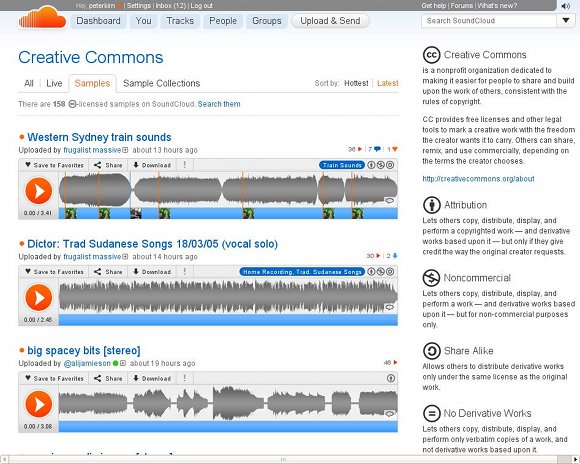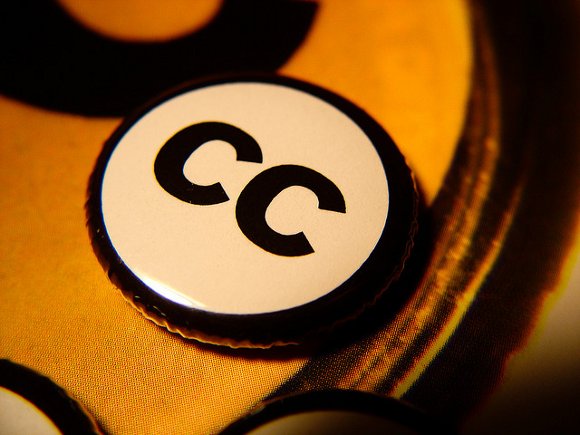Finding samples and remix-able music — or advertising the availability of tracks you want to release for that purpose — has just gotten a lot easier. As part of a raft of improvements to the SoundCloud service – including some nice non-CC enhancements to search and tag browsing – the service has boosted integration with free licenses. You can now search for CC content, and the license is visible directly in the player, going beyond what even services like Flickr and Vimeo have done.
You can add SoundCloud to CC-focused sites like ccMixter and the Freesound Project as tools in your freely-licensed arsenal.
I spoke to the folks at SoundCloud about the changes, and about how they see Creative Commons fitting into a larger picture. Henrik Lenberg, Business Developer at SoundCloud responds.
CDM: Can you detail exactly what’s changed?
SC: As far as Creative Commons features are concerned, the biggest changes in this release have been the introduction of a CC landing and discovery page, prominent placement of license information on track players and pages, and advanced search by license type. The basic features before provided a really simple way to select a license, and these changes make it more straightforward to find and identify Creative Commons-licensed material on the site. SoundCloud is geared particularly towards audio creators, and this release should make it much simpler to find samples, sounds, and tracks that can be used for remixes, mashups, and other compositions.
What have been some of your favorite uses of CC so far on SoundCloud?
We’re just wrapping up a series of blog posts with some of our favorite CC users on the site, which can be seen at http://blog.soundcloud.com/tag/ccinterviews. You can see there we’re getting all kinds of music under CC licenses on SoundCloud, but also field recordings, audiobooks, and plenty of other sounds. As far as samples are concerned, we’ve got the OLPC Sample collection online, which is over 6000 CC-BY samples, as well as really interesting collections, like the Stretta Samples and Karmadrums who makes on-demand drum loops on real drums. We’ve also got all kinds of sample-making companies, including Twisted Tools and Sample Magic.

How do you hope the new functionality might be used? What do you think might come out of it artistically?
I’m sure that some of the uses will surprise even us, but I’m expecting to see the same kind of outpouring of creativity that has accompanied Creative Commons licenses on other platforms. I hope there’s an uptick in remixes of CC licensed material on the site, and I imagine that video creators, podcasters, independent video game makers, and other people who need to find music for their works will begin to discover SoundCloud as a resource.
With more Music Hack Days coming up, what does this release mean for the developer community?
We’ve included Creative Commons filtering in our API so now you can build apps that let you find and use CC content in various ways. For example, one thing we expect to see is the possibility to search and browse samples and sound effects within your favorite sequencer or audio editor, then preview the results and drag and drop the sounds you prefer right into your arrangement. We believe that bringing tools and content closer together really can change how audio is shared and reused, and Creative Commons is an important piece of getting this puzzle together. We’re big music hack day fans, and glad to offer developers an easy-to-use resource for any type of CC content.
We hear regularly from the Creative Commons organization about how they perceive the business potential of artists, and why it isn’t simply creators giving their work away for free with no reciprocal benefit. We also hear from naysayers who, very often, seem to have little understanding or experience of CC. Coming at this from the perspective of a third party, what do you think the value might be for independent artists?
Well, first off, it’s absolutely true that Creative Commons licenses aren’t for every artist, and they’re not a magic bullet to finding a business model or getting your music heard. But it’s also important to note that every CC license requires at least attribution to the original artist. While there are certainly some artists who have the problem of too many fans trying to listen to their music free, many more are grappling with the issue of getting their name out there, and all of the CC licenses make sure that if your material is being used you’re still getting credit.
Ultimately, there are a lot of musicians and other artists who actually want to allow people to copy music for their friends, or to sample it or remix it, or use it in an independent film or game. Creative Commons is just about letting artists and users make that agreement in a simple and straightforward way, by granting permission in advance, and reserving the rights that artists do want to hold on to. Again, not everybody sees things the same way, and we’re not trying to make everybody use one license or another. For users who do want to use these, we’re simply giving them the freedom to do so.
What about labels, who have tended (with the exception of the various netlabels who focus on CC) not to use the technology? Is there a place to demonstrate some use to that crowd?
There may be a way to convince labels to use Creative Commons, but it’s not really something we’re focusing on at SoundCloud. Netlabels using CC have gotten increasingly popular, and there are many very high-quality ones on SoundCloud now. There have also been a few high-profile artists who have broken from their labels in order to pursue alternate distribution methods, including releasing under Creative Commons licenses, but those are still a bit rare. Maybe as more examples pop up of artists releasing profitable CC-licensed music, that will convince the major labels to experiment a bit more. We’re not here to push one business model or another, but if it ends up being something they want to explore, we’re ready for them with the features!
If you’re ready to check out SoundCloud’s Creative Commons implementation, have a look here:
http://soundcloud.com/creativecommons/samples
Find, Remix and Reuse – SoundCloud Style [SoundCloud blog]
